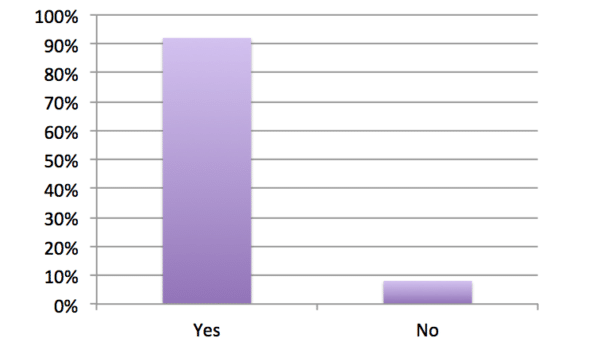
Counting calories is one of the most classic, go-to diet tactics for people looking to lose weight. The idea of counting calories is simple – consume below the amount of calories allocated per day by counting the calories of every food consumed over the course of a day, week or month.
However, over the past few years, many dietitians have debated the pros and cons of counting calories to lose weight. On one hand, many argue that counting calories provides structure, is straightforward, and can help people become more aware of health habits and encourage behavioral change.
On the other hand, the premise of simply counting calories suggests that all calories are “equal” in their health impact. A strict calorie counter would fail to take into account how calories from different sources are treated in the body.
In light of the current conversation, we asked physicians, “do you count/track the calories you consume?”
Out of the 1068 physicians who responded from over 40 countries, and overwhelming 69 percent answered ‘no’:
“Basing a correct diet on the mere calculation of calories can be misleading because there are foods that do not contain calories and facilitate the increase of body weight (artificial sweeteners) and foods that have a substantial number of calories and improve the state of health and do not fatten (olive oil, dried fruit, dark chocolate).” – Pediatrics, Italy
“It’s very difficult to make a calculation of the calories I take in every day, especially with our work schedule: you cannot always count lunch or dinners enough to make an accurate account!” – Ophthalmology, Italy
I do not recommend counting calories … I suggest losing weight by exercising more or contacting a dietician.” – Orthopedic Surgery, Italy
“The counting of calories, including for overweight people, is a gas plant with a huge margin of error that ultimately is useless.” – Cardiology, France
“I have never counted calories when eating. In some metabolic diseases, one should count the calories, such as with diabetes.” – General Practice, Venezuela
“I do not count calories, but I try to eat balanced in relation to the proportion of macronutrients. For me counting calories would be a bit stressful, however, patients with certain chronic diseases would benefit from more adequate calorie consumption, but this should always be determined by a nutritionist.” – Pediatrics, Venezuela
“I do not count the calories, I try to make the diet balanced, consume water, have breakfast as a king, have lunch as a princess and dine as a beggar.” – Physical Medicine, Venezuela
“I think mindfulness of what you are eating and how much is needed is better than computing calories.” – Pediatrics, Australia
“I don’t count calories but I measure portions.” – Radiology, US
“I weigh myself daily. I don’t exactly count calories but I’m always aware of how much I eat. If weight gets above my threshold, I cut back until it comes back down. Simple physics. Even if you are eating ‘healthy’ foods, too much will make you gain weight.” – Family Medicine, US
The poll was fielded in April of 2018. 1,068 physicians responded to the poll. The margin of error for the global poll was ±3%. More information about SERMO polling methodology can be found here.
Are you a doctor? Join SERMO to join the conversation and discuss your medical experience with other global physicians!














